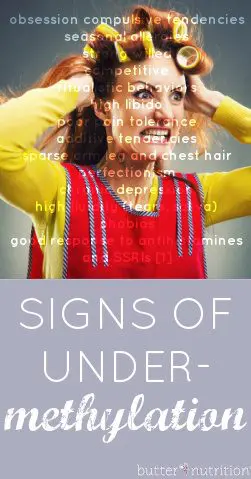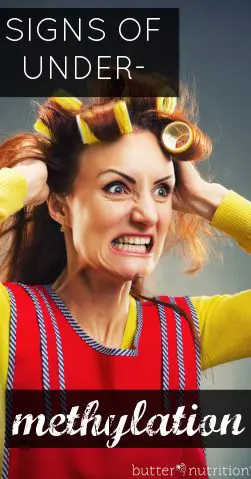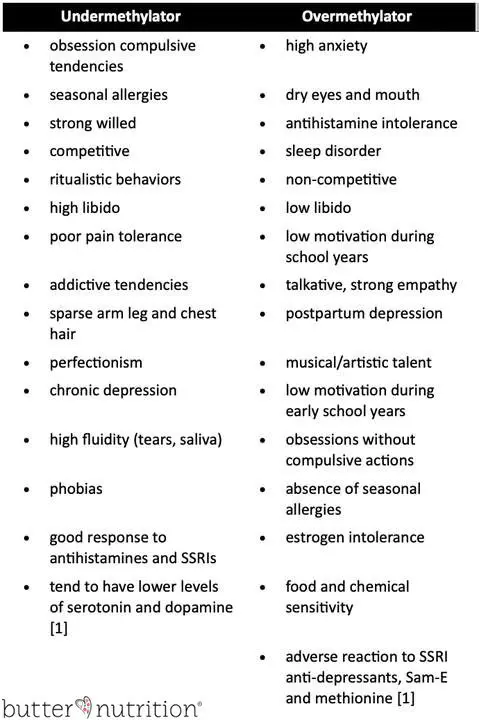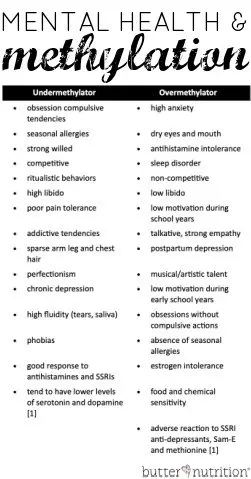
Methylation is complicated, but I'm going to get overly simplistic today to tell you what you need to know about undermethylation.
You may have been told you have a MTHFR (Methylenetetrahydrofolate reductase) genetic variant that has the potential to impact methylation.
The key word here is potential.
While genetic testing for MTHFR can be helpful, it can also be counterproductive, especially when there's an inexpensive blood test that can give you precise clues to what is happening with your methylation in the now. You see, genetics only show you what can happen.
What is Methylation?
Methylation is the biochemical process of moving a methyl group (CH3) from one substance to another.
In an oversimplification, undermethylators have a shortage of methyl groups and can benefit from getting more methyl donors, whereas overmethylators have too many methyl groups. Both extremes can cause unpleasant and uncomfortable symptoms, many impacting mental health.
Dr. William Walsh, a lead researcher in arena of biochemical illness estimates that 21% of people are undermethylatiors, 9% are overmethylators and around 70% have normal methylation.
Knowing your methylation status over your genetic MTHFR status can be extremely helpful if you're accustomed to mental health challenges.
Methylation status can be assessed by checking histamine levels in the blood. High histamine can indicate undermethylation, as the methylation process breaks down histamine (suggesting under-activity), whereas low histamine levels can suggest overmethylation (suggesting over-activity). Of course, one can also be a 'normal' methylator with average histamine levels (more on histamine later).
Signs of Undermethylation
According to Dr. William Walsh, the signs of undermethylation are abundant:
- obsessive compulsive tendencies
- seasonal allergies
- strong willed
- competitive
- ritualistic behaviors
- high libido
- poor pain tolerance
- addictive tendencies
- sparse arm leg and chest hair
- perfectionism
- chronic depression
- high fluidity (tears, saliva)
- phobias
- good response to antihistamines and SSRIs
- tend to have lower levels of serotonin and dopamine [1]
Conditions associated with undermethylation include autism spectrum disorders, antisocial personality disorder, schizoaffective disorder, oppositional defiance, anorexia and depression.
Causes of Undermethylation
The causes of undermethylation are typically a combination of the following:
- Protein deficiency (undermethylators do not do well on low animal protein diets such as vegan and vegetarian)
- Malabsorption
- Histamine overload (gut health is big factor)
- Genetic mutations (MTHFR, MS, COMT, etc.)
Remedy to Undermethylation
Nutrient therapy and dietary interventions can be extremely beneficial to balancing the biochemistry of undermethylators.
Important nutrients to support undermethylators include getting more methyl donors in the diet:
- Methionine* (an amino acid found abundantly in protein)
- Sam-e*
- B12
- TMG (trimethylglycine or betaine)
*Methionine and Sam-e act as natural selective serotonin reuptake inhibitors (SSRIs) that can aid in increasing serotonin or the 'feel good hormone' in the brain.
Other supportive nutrients on a case-by-case basis:
- Calcium
- Magnesium
- B6
- B2
- Folate (some undermethylators do great on folate, whereas it can make symptoms worse for some undermethylators with depressive-like symptoms)
- Creatine (helps to spare Sam-e)
Other factors to consider:
- Avoiding vitamin A toxicity (can deplete folate + B12)
- Getting adequate sun exposure (for vitamin D and other factors that aid in histamine reduction)
- Improving overall gut health (important since gut bacteria can be a source of histamine as well as help manufacture B vitamins)
Undermethylation Debate
Using whole blood histamine levels to assess methylation status is not without controversy.
Some big names in the nutrition world detest this method of methylation classification due to blood histamine's ability to be influenced by other factors, such as gut health and diet. Certain opportunistic gut bacteria are histamine-producers and when overgrown increase histamine levels in the body. Such histamine producers include Morganella, Klebsiella, Klebsiella pneumoniae, Pseudomonas, Pseudomonas aeruginosa, Citrobacter freundii, Proteus, and Proteus mirabilis. Histamine is also found in food, so a high histamine diet can impact blood histamine levels.
As someone who regularly tests gut bacteria levels in clients, I absolutely agree that both gut microbiome status and diet can impact histamine levels and should be taken into account when assessing a person's methylation status, but I still think testing blood histamine is an amazing tool to get insight into what is going on right now in regard to methylation. In a perfect world gut health should always be addressed before methylation, since gut infections will cause methylation issues on their own.
Knowing a client's methylation status opens up a world of information for how I can best support them and where their body is currently at.
Testing for undermethylation
Testing for whole blood histamine is the primary tool for helping to identify methylation status. Elevated whole blood histamine suggests undermethylation, whereas low whole blood histamine suggests overmethylation, but other factors and symptoms should always be taken into account. There are also other testing panels available that look at the SAMe/SAH ratio.
Testing for methylation status:
- Whole blood histamine combined with high absolute basophils (methylation marker)
- SAMe/SAH ratio
You can find whole blood histamine testing in a 'blood labs' package here (US only) or grab the Mood eCourse on so you can make sure your body has all the raw materials it needs to support its natural desire for health.
Regardless of your methylation status, methylation imbalances are a sign your liver needs support. Get the data you need on your body so you can give it what it needs!
Does undermethylation sound familiar to you? Please share in the comments!
References:
[1] Walsh Research Institute
[2] Walsh, William. Nutrient Power: Heal Your Biochemistry and Heal Your Brain. Skyhorse; Revised, Updated ed. edition (May 6, 2014).
[3] "The Role of Methylation and Epigenetics in Brain Disorders" presented by William J. Walsh, PhD










Underovermethylator
I honestly find this very confusing...
I clearly have methylation problems, and SAMe made me feel better when I tried it recently. HOWEVER, my symptoms are almost exclusively from the overmethylator list, except I do well with methionine, and I'm low in it on the urine test, my suspicion being that it has to do with amino acid deficiency that resulted from the long term vegetarian diet...
From the undermethylator list I had depression, when I was vegetarian, I was strong-willed and a perfectionist at that time. Funny how diet can influence so many things.
Now, I have huge histamine issues, antihistamines make me have panic, but, like I said, SAMe improves my mood a lot. I have lots of food and chemical sensitivities with elevated IgGs, and zero IgE allergies.
JGO
I am also a Under & I react HORRIBLY to antihistamines. They cause insane waves of Panic and uneasiness. Tagamet years ago legit cause me suicidal thoughts.
In spring of 2021 the sickest I have ever been my Plasma Histamine was 18 which is 9x's over. Also I am SIBO prone and it seems MTHFR & SIBO are a symbiotic duo of hell.
But for me Methly B's have been life changing. I also react well to magnesium
Jackie Aldridge
I am an under-methylator. Found by genome testing. It is why many people in my family get pernacious anemia. We need mentholated folate to absorb vitamin Bs. So I buy metholated folate and vitamin B complex. I don't feel a marked difference but I think it's helpful in preventing low levels of B-12 which I often show in tests.
Catherine Crow, NTP
Genetic testing just shows your genetic potential. It doesn't show you if that gene is actually a problem now. That's what the testing here can show you.
Abundantly,
Catherine
KMP
Great information. My daughter just had her histamine level checked and it is 27. She has been diagnosed with unspecified neuro developmental disorder. Could this be related to histamine?
Catherine Crow, NTP
There are a few different histamine levels you can check, it may not have been whole blood histamine like I'm referencing here.